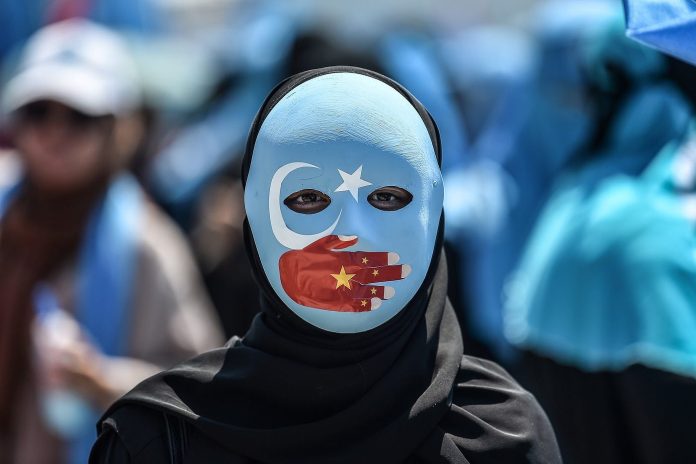Rushan Abbas has spent years fighting for the freedom of her people, the Uyghurs, a Muslim ethnic group in the Uyghur Region, located in northwest China.
Despite being “autonomous,” meaning that, in theory, it should have some self-governing powers, the region remains tightly controlled by the Chinese Communist Party (CCP). Rich in resources like oil, gas, and cotton — producing a fifth of the world’s cotton — the region serves as China’s gateway to Central Asia, the Middle East, and Europe. It is also home to approximately 12 million Uyghurs who speak their own language, and have their own culture that is ethnically closer to Central Asian countries.
For decades, the CCP has tried to forcibly assimilate Uyghurs into Han Chinese culture through mass surveillance, forced labor, torture, and concentration camps (which the regime calls “re-education centers”). It has systematically attempted to erase their language, religion, and livelihood while carrying out beatings, enforced disappearances, targeted killings, sexual abuse, and forced sterilization to eliminate the Uyghur population. The regime has also built at least 380 detention camps in what is the largest mass incarceration of an ethnic group since the Holocaust. But the repression isn’t just physical — it’s financial, too.
China has turned the Uyghur Region into a police state where every financial transaction is monitored and Uyghurs face constant threats of financial censorship.
“The entire Uyghur Region is a police state. Every space, every property, any amount of money in the bank, everything is being surveilled. They know everything. Every Uyghur person has a mandatory spyware app installed on their phone. If you have any kind of communication with your bank on banking apps, they see how much money is coming in and out, which businessman has how much money… The government knows everything,” Abbas told me.
Beyond surveillance, financial repression allows the CCP to freeze assets and cut Uyghurs from economic participation. Banks must comply with state orders without question.
“If [the] government goes to the bank with a list of 100 Uyghur names and says, you know, ‘give me the bank balance for these people [and] how much money they have.’ The bank will print it out and hand it over to the CCP. Then, they shut down the bank accounts, freeze their assets, and they take their properties,” she said.
Confiscation is another tool of control. Uyghur academics, business owners, and community leaders have been imprisoned and their properties seized. A new report by the International Network for Critical China Studies reveals that the CCP also forces rural Uyghur farmers to surrender their land rights, transferring control to the state for industrialized agriculture, and pushing them into forced labour. Between 2001 and 2021, land-use transfers in the Uyghur Region surged nearly 50-fold, displacing ethnic farmers.
Beyond farmland, Uyghurs have also faced obstacles in retaining home ownership. In one case, the Chinese regime gave homeowners 12 months to re-register their homes or risk losing them. This re-registration was merely a bureaucratic process forcing Uyghur homeowners to formally reapply for ownership.
“Well, the owners are in the [detention] camps. How do you re-register your house, your land, your business, your properties? Anybody who did not re-register their properties or re-reclaim their own properties, was taken over by the government,” Abbas said. “There were so many videos of Han Chinese settlers moving into Uyghur homes. So, in the rural area, where the Uyghurs have a home, the home comes with land. Most Uyghurs in the southern region are farmers and have farmland. All of these farmlands and homes were claimed by Han Chinese settlers.”
With their homes, land, and assets stripped away, Uyghurs are pushed into the regime’s so-called Poverty Alleviation Program — which, for Abbas and most Uyghur activists, is another name for forced labor.
“The Poverty Alleviation program is designed to reduce the Uyghur demographic in the region and [increase] control over their livelihood — their traditional livelihood, their homes, their way of living — and ship them into wage labour, often in industries that benefit Han Chinese settlers or state enterprises or the factories. And if they refuse any kind of those transfers, they will be punished,” she said.
“So, what do you call that? If you have no choice and they just ship you off and you have no contact with your family members. You cannot leave the factory and go visit your families. What do you call that? That is modern slavery.”
Millions of people, like the Uyghurs, live under centralized financial systems that — at the whim of authoritarian rulers — can be erased overnight. Whether through surveillance or asset seizure, financial repression paralyzes Uyghurs and makes resistance against the CCP nearly impossible. It is, of course, not surprising that authoritarian regimes like the CCP are increasingly turning to financial surveillance, confiscation, and repression to control — and worse, erase — the Uyghur people.
The freedom to communicate and transact freely, beyond the reach of dictatorships, has never been more critical. Abbas reminds us that these freedoms aren’t just about convenience but about survival, both personal and cultural.








































